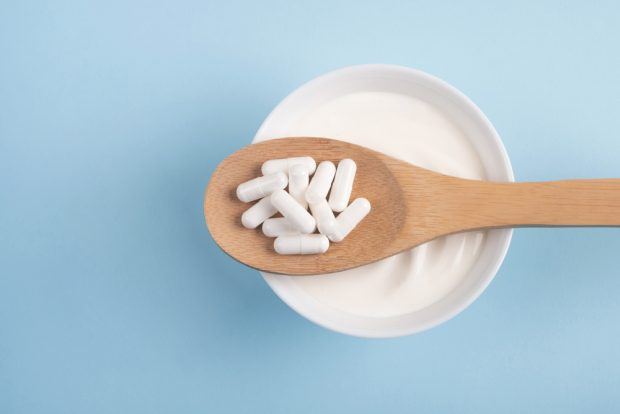From overeating during the holidays to suffering from chronic stress, the natural balance of bacteria in your digestive system can become disrupted. This can cause uncomfortable symptoms. That’s why, in this article, we’ll discuss:
- The importance of a healthy digestive system and gut
- Signs and symptoms of a bacterial imbalance
- How probiotics & prebiotics can support gut health
Stay tuned as we talk about guts, digestion, probiotics, and prebiotics, so you can say goodbye to your woes this festive season.
Why do we need a healthy gut?
Digestion is a crucial function of the body. It breaks down the food we consume into the building blocks needed to perform vital processes such as energy and cell repair. Our bodies require these proteins, carbohydrates, fats, vitamins, and minerals to stay healthy and maintain proper function. And these are all broken down by gut bacteria.
“About 100 trillion bacteria, both good and bad, live inside your digestive system. Collectively, they’re known as the gut microbiota.” Harvard Health Publishing
You might have a bacterial imbalance if you experience things like an upset stomach, excess bloating or gas, and even depression. This can be caused by anything from antibiotics to your diet, sleep disorders, stress, and exercise. In fact, studies show that these bacteria and overall gut health are directly linked to your mood because a large amount of serotonin, a key neurotransmitter, comes from the gut.
Additionally, some studies suggest diseases can begin in the gut thanks to more undesirable bacteria called endotoxins finding their way into your bloodstream. These are recognized as foreign molecules and can cause chronic inflammation as your body defends itself.
“Inflammation is linked to a range of diseases such as obesity, diabetes, and heart disease.” says the U.S. National Library of Medicine, Involvement of gut microbiota in the development of low-grade inflammation and type 2 diabetes associated with obesity.
How probiotics and prebiotics can support gut health
Your diet and lifestyle are the most important factors in optimal gut health. That’s why you should consume a balanced diet. It should contain plenty of high-fiber vegetables, lean proteins, and whole grains. You should also minimize the consumption of processed, high-sugar, and high-fat foods.
And that’s where probiotics and prebiotics come in. There are thousands of different kinds of bacteria in the gut – some are helpful, and some are not.

Helena Nechaeva/Shutterstock
- Prebiotics are food or fertilizer for the good bacteria in the gut.
- Probiotics are live bacteria that are present in certain fermented foods and support your naturally occurring bacteria.
Prebiotics can be found in many foods we consume daily, including:
- Garlic
- Chicory root
- Onions
- Artichokes
- Bananas
- Dandelion Greens
- Whole oats
- Apples
On the other hand, probiotics are commonly taken in supplement form and added directly to food products, though they can be consumed via fermented foods such as:
- Yogurt
- Kefir
- Tempeh
- Kimchi
- Sauerkraut
- Pickles
Your body needs a balanced diet and a harmony of pre and probiotics to ensure the bacteria in your digestive system and gut works as required. And that the rest of your body is supported in its day-to-day activity. So, it’s clear to see how sudden dietary and lifestyle changes like overeating, drinking too much alcohol, or not getting enough exercise can have a big effect on your gut, and in turn, your overall mood.
Should I increase my probiotics and prebiotics over the festive period?
The festive season is classically a time of overindulgence and overeating many rich foods, so you might think you need to increase your intake.
The increased amount of sugar and alcohol could impact your balanced gut, so eating plenty of prebiotic foods to feed the good bacteria is an apt suggestion. Perhaps consider porridge for breakfast, or eat bananas and apples often, and remember to moderate your indulgences when you can.
Probiotics are harder to eat during the festive season as they aren’t typical tasty, so taking supplements or yogurt drinks in the mornings might be the best option.
However, it’s not necessary to increase your intake too much as a routine is far more important, so don’t skip out on what you usually do. Nutritionists recommend you “Start now and continue daily throughout the festive season” to help reduce any potential problems.
Can you take too many prebiotics or probiotics?
Not really, though Dr. Ciorba noted in an article that “One may experience GI distress or bloating if taking too high of an amount, depending on the probiotic”. Overall, the best way to take pro and prebiotics is consistent. This way, your microbiota is fed and supported to continue all their essential work.
Most nutritionists and dieticians agree that how much you need varies on what strain is used in production. They also agree that some products have efficacy issues. However, many are trying to mitigate efficiency and potential die-off issues during manufacturing:
“The dose required for probiotics varies greatly depending on the strain and product. Although many over-the-counter products deliver in the range of 1–10 billion CFU/dose, some products have been shown to be efficacious at lower levels, while some require substantially more.” World Gastroenterology Organisation
If you have a serious condition, it would be best to consult your doctor or nutritionist for dosing advice. If you are taking supplements and consuming prebiotics for general health reasons, follow the manufacturer’s guidelines on dosage.
When should I start boosting?
If you’re considering taking probiotic and prebiotic supplements, the best time to start is now. Just make sure you monitor the impact on your digestive system before and after. Consider:
- Are you less bloated?
- Is your stomach less upset?
- Is your skin clearing up?
- Do you have less gas?
If you note no differences, then it’s likely your previous routine was sufficiently supporting your digestive system.
In case you’re wanting to prepare for the holidays, consider what issues you’ve had over the festive season before. You should then assess whether pro and prebiotics can help. If you have no serious health concerns, start with supplements from your local health food store or supermarket yogurt section. If you’re worried a change in diet will impact any of your existing issues, check with your GP first.
How do I know if the prebiotics and probiotics are working or not?
Since probiotics and prebiotics are all for your digestive system, that is where you should notice changes. As stated above, keep track of anything new, like improved bowel movement, less gas, fewer upset stomachs, and less bloating. These are all signs your pro and prebiotic supplements are working.
It won’t be a quick change, as with any biological issue, you may not notice anything new for a few weeks as your microbiota make the most of their new fertilizer and support.
However, if the symptoms are worse, you should stop and speak to your GP for more help.
Bottom line
To summarize, remember to give your gut the love it deserves this festive season by keeping unhealthy foods to a minimum. Everything in moderation is a good rule to follow, and try not to make it the norm, otherwise, your gut may let you know it’s unhappy.
MAIN IMAGE CREDIT: Meeko Media/Shutterstock
References
- https://www.health.harvard.edu/staying-healthy/can-gut-bacteria-improve-your-health
- https://www.ncbi.nlm.nih.gov/pmc/articles/PMC6089374/
- https://pubmed.ncbi.nlm.nih.gov/25162769/
- https://www.ncbi.nlm.nih.gov/pmc/articles/PMC3463487/
- https://gutscharity.org.uk/advice-and-information/health-and-lifestyle/prebiotics-probiotics/
- https://www.nhs.uk/conditions/probiotics/
- https://www.baldwins.co.uk/supplements-essences/digestive-health-cleansing/probiotics
- https://www.optibacprobiotics.com/uk/learning-lab/in-depth/gut-health/nutritionist-christine-baileys-healthy-christmas
- https://www.health.com/condition/digestive-health/can-you-overdose-on-probiotics
- https://www.worldgastroenterology.org/guidelines/probiotics-and-prebiotics/probiotics-and-prebiotics-english
- https://www.medicalnewstoday.com/articles/how-long-does-it-take-for-probiotics-to-start-working
Who is the author?

Debbie Woodliffe
Debbie Woodliffe is an experienced writer currently based in the UK as Head of Content Affinity Agency. She has been a part of the creative and writing industry for the last 11 years.
She is currently working with companies such as Baldwins to help generate content that is designed to inspire, educate, and inform the reader on relevant, timely topics.



![women [longevity live]](https://longevitylive.com/wp-content/uploads/2020/01/photo-of-women-walking-down-the-street-1116984-100x100.jpg)










